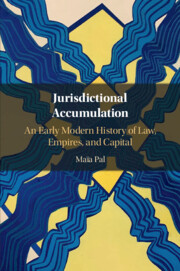Book contents
- Jurisdictional Accumulation
- Jurisdictional Accumulation
- Copyright page
- Dedication
- Epigraph
- Contents
- Acknowledgements
- Introduction
- 1 Early Modern Extraterritoriality
- 2 Historical Sociology, Marxism, and Law
- 3 Social Property Relations
- 4 Ambassadors
- 5 Consuls
- 6 Colonial Practices of Jurisdictional Accumulation
- 7 Analytical Crossroads
- Epilogue
- Bibliography
- Index
2 - Historical Sociology, Marxism, and Law
Published online by Cambridge University Press: 15 October 2020
- Jurisdictional Accumulation
- Jurisdictional Accumulation
- Copyright page
- Dedication
- Epigraph
- Contents
- Acknowledgements
- Introduction
- 1 Early Modern Extraterritoriality
- 2 Historical Sociology, Marxism, and Law
- 3 Social Property Relations
- 4 Ambassadors
- 5 Consuls
- 6 Colonial Practices of Jurisdictional Accumulation
- 7 Analytical Crossroads
- Epilogue
- Bibliography
- Index
Summary
Chapter 2 discusses historical sociology as the framework adopted to develop a new approach to early modern jurisdictions. The project aims to enrich diplomatic history's institutional and cultural paradigm through a more productive engagement with new legal histories of extraterritoriality and historical materialist approaches. Debates regarding Eurocentrism and how to conceptualise imperial agency in historical sociology are discussed, and an outward methodological internalism is proposed as required by the research problem posed in Chapter 1, namely the problem of narrow and linear sources of the means of imperial expansions of authority such as ambassadorial immunities. To frame this methodology, the commodity form theory of law is discussed as a powerful but overly structural approach to processes of expansion that conflates mercantilism and capitalism. In response, the methodology is framed instead by Political Marxism, as a more agency-based and historicist approach to international history, that relies on the concept of social property relations.
Keywords
- Type
- Chapter
- Information
- Jurisdictional AccumulationAn Early Modern History of Law, Empires, and Capital, pp. 48 - 102Publisher: Cambridge University PressPrint publication year: 2020

